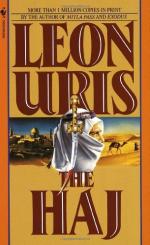|
This section contains 514 words (approx. 2 pages at 300 words per page) |

|
Leon Uris's "The Haj" could have been a different and far better book. Returning to the scene of his huge 1958 best seller, "Exodus," Mr. Uris attempts here to explore a Palestine in tumultuous upheaval between 1944 and 1956, hoping to shed light on what still remains a bewildering political and religious impasse. The illumination he provides, however, is so thoroughly dimmed by a severely biased viewpoint that the book loses all power as a work of fiction and all credibility as an objective study of that depressing and continuing deadlock.
The hero—if he can be called such—of the novel is Haj Ibrahim al Soukori al Wahhabi, muktar (or head) of the village of Tabah, close by the Shemetz Kibbutz on the road to Jerusalem. We come to know this man through an alternating dual narrative recited on the one hand in the first-person voice of his son, Ishmael...
|
This section contains 514 words (approx. 2 pages at 300 words per page) |

|


